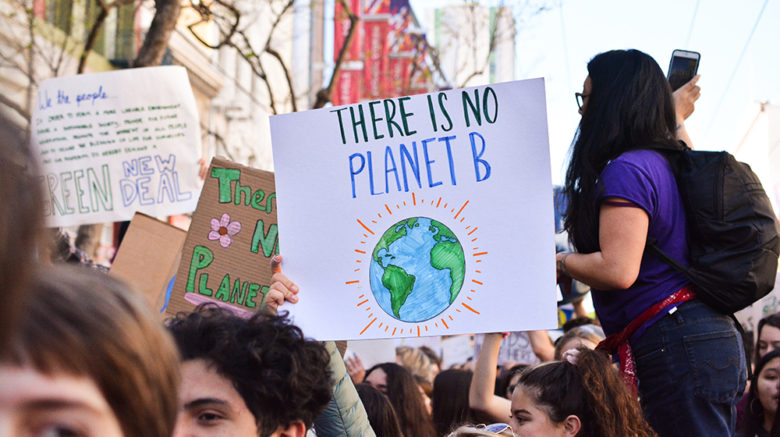This post originally appeared on TheHumanist.com.
People often make New Years’ resolutions about diet and exercise to try to adopt healthier lifestyles. Health has certainly been on everyone’s mind during the COVID pandemic as we see how easily illness can spread and how interconnected all living things are. Humanists understand we only have one life on this one planet, so we follow the science and take action to combat our climate crises.
As part of our Humanist Environmental Response Effort (HERE) for Climate initiative, AHA staff made commitments to help make the planet healthier in 2021 and invite you to join us. Get inspiration from our Live Sustainably page and let us know what actions you will take or what questions you have about how to be #HEREforClimate.
In renovating our 1957 kitchen these past few months, my husband and I have made careful choices in utilizing sustainable materials from all-natural flooring to energy-efficient windows and appliances. In 2021, we plan to continue our improvements, preserving our existing home while making it energy and water-efficient throughout. I will continue taking advantage of eco-friendly online markets, such as earthhero.com, that are committed to providing earth-friendly products. And I am devoted to raising awareness and motivating others to take action through dedicated programming and initiatives in the AHA’s Center for Education HERE for Climate project. Please join us next Thursday for the first of our 4-part series Energy, Equity, Health, and Solutions in Relation to Climate Change.
—Kristin Wintermute, Director of Education
As an environmental science undergrad student, I am constantly taking in information surrounding climate change from some amazing and intelligent experts. Therefore, I often reflect on how I can take what I learn in the classroom and put it into action. The thoughts and ideas become overwhelming as there is so much that needs to be done and so much of that seems out of my personal control. If I had to narrow it down to three goals, they would be: putting a greater effort into sharing knowledge about climate change and its effects with my friends, family, and general acquaintances, keeping up with current climate legislation so I can effectively contact my representatives, and a more simple one – eat less meat.
—Caroline Peters, HERE for Climate Intern
I want to inspire others to adopt a plant-based diet by increasing my outreach and advocacy. I’ve been a vegetarian/vegan most of my life, and my educational background is all environmental (a JD at environmental law school, an MPA in environmental science and policy, and a BA in environmental studies). I feel I have a responsibility and a privilege to inform others about the meat industry and climate change so they too can make informed food choices.
—Monica Miller, Legal Director & Senior Counsel
While I can’t commit to completely eliminating meat from my diet, I also recognize that the factory farming of livestock has profound implications on the environment (to say nothing of the obvious ethical concerns!). My meat diet up until now has been unnecessarily indulgent, and starting in 2021 I plan to cut back. Beyond that, I’m working with a landscaper this year to add native, low-impact, low-water plants to the yard around my house to strengthen my personal green space without going overboard on water consumption.
—Pete Bjork, Web Content Manager & Managing Editor
I plan to utilize the local farmers market composting station so that food scraps can be repurposed rather than merely dumped with the garbage. I’m also investing in reusable resealable plastic bags to reduce the amount of plastic I use day-to-day. I also will continue to walk/bike/scooter to places that I need to go (perk of living in DC as it’s very traversable, but not all places are similarly situated). I hope to be able to buy my produce from sustainable sources (e.g. local farmers/farmers’ markets), rather than the grocery stores. I’ll also up to date and informed on our environment both domestically and globally.
—Andrew Hulett, Legal Fellow
2021 will mark ten years living vegan. A vegan lifestyle supports a more just and equitable food system that affects nonhumans, humans, and the environment. This coming year, I aim to do more to improve access to affordable and sustainable foods.
—Meredith Thompson, Development Associate
Ever since learning about water conservation as a child, I’ve tried to be mindful of not wasting water (like turning off faucets and fixing leaks) and not contaminating water (like reducing plastic waste and improving sewage drainage). I’ve been reading about more ways I can protect this essential and limited resource daily like taking shorter showers at a lower temperature, using cold water for laundry more often, and reusing water used to cook pasta or wash produce.
—Emily Newman, Education Coordinator

